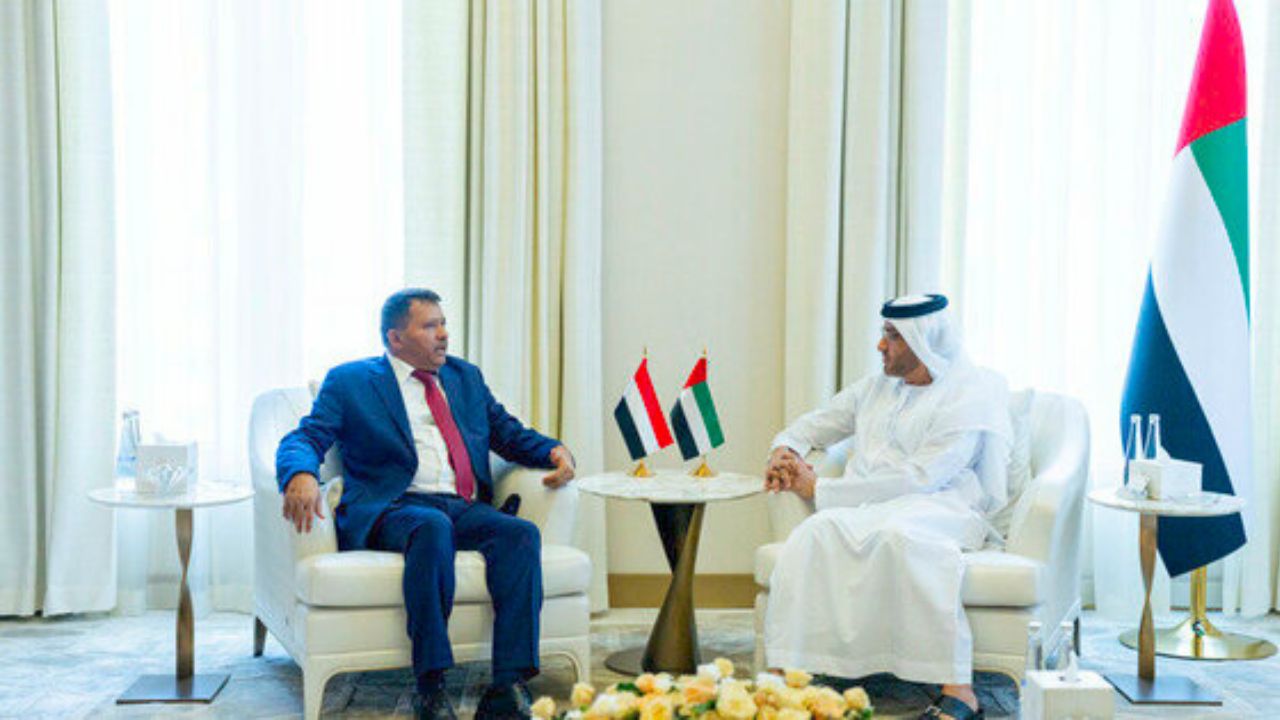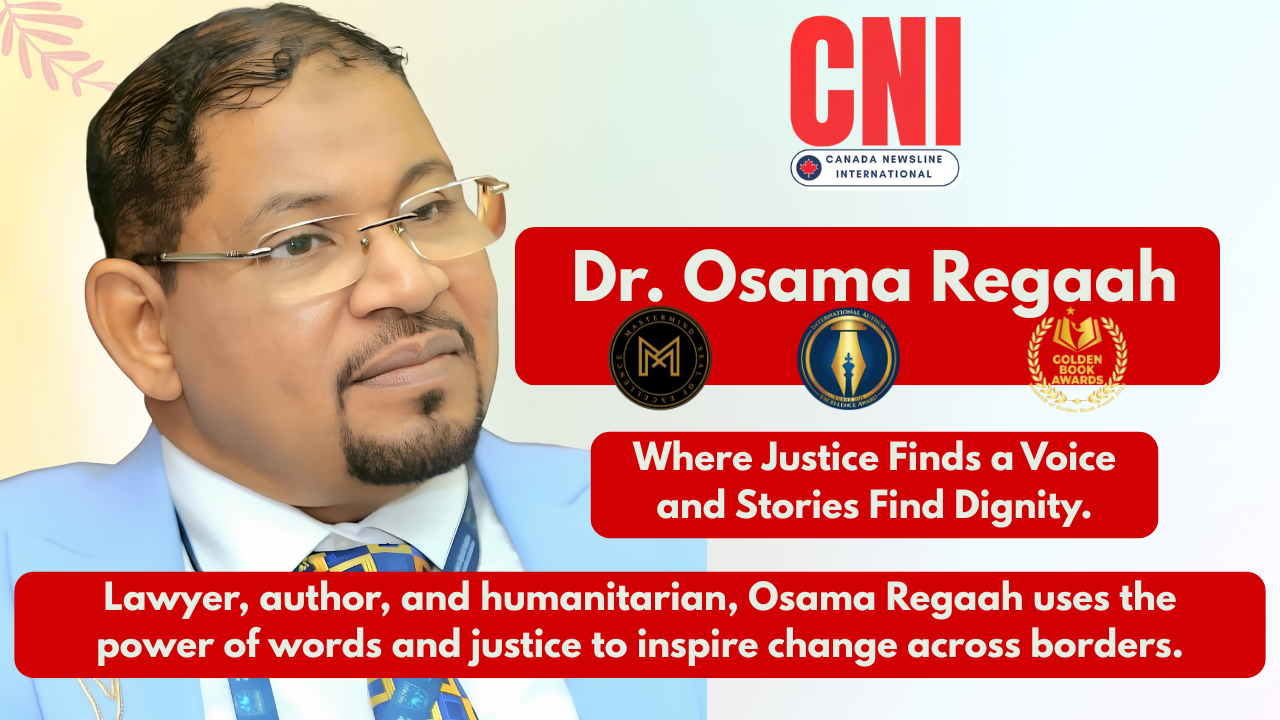
UAE and Yemen Strengthen Legal and Judicial Cooper
UAE and Yemen attorney generals met in Abu Dhabi to strengthen legal ties, enhance public prosecutio

In every generation, there are individuals who resist easy classification. Some follow a straight path—lawyers defend clients, authors fill pages, activists raise their voices. But there are others whose journeys carve bridges between worlds that most consider separate. Osama Regaah belongs to that rare breed of people who insist that law and literature are not opposites, but partners—like river and bank, each meaningless without the other.
To call him a lawyer alone would be incomplete. To call him a writer alone would be unjust. And to call him a humanitarian alone would fall short of the truth. Osama is all three—and more—woven into one life mission: to restore dignity where it has been stripped away and to give voice where silence has prevailed.
Osama’s philosophy of law is not about bureaucracy, politics, or the endless paperwork that crowds most people’s image of the justice system. For him, the law is a living tool—a shield meant to protect, not a sword meant to harm.
Early in his career, he saw how legal systems, if twisted, could become tools of oppression. Where some might have responded with cynicism or resignation, Osama responded with action. He founded initiatives that connected the most vulnerable in society with volunteer lawyers, creating a bridge between those without power and those with the ability to defend them.
His view is sharp, humane, and deeply practical:
“When justice is sold, it becomes a commodity. When it is given, it becomes a value. The oppressed need justice even before they need bread.”
In every case he takes on, Osama does not merely ask whether the law was followed. He asks something more enduring: was humanity upheld? That guiding question has made him not only a lawyer in practice but a defender of dignity in principle.
If law is Osama’s shield, literature is his song. For him, writing is not an escape from reality but a deeper confrontation with it. His novels, essays, and travel writing resonate with voices that are often ignored: abandoned women in courtrooms, families too poor to defend their rights, strangers whose stories might otherwise disappear without trace.
“In law, a woman without support is often the weakest link,” he reflects. “Literature gives me the means to grant her the strength of words.”
Osama’s writing is not sentimental sympathy—it is lived empathy. Growing up close to hardship, he understood the silence of poverty and the weight of survival. His characters and narratives are not abstract constructions; they are reflections of eyes he has met, voices he has heard, and lives he has walked alongside.
His celebrated novel Transparent Ghost remains one of his most striking achievements. Merging the contemporary corporate world with mythological undertones, the novel interrogates questions of death, afterlife, and divine justice. Each line carries the sense of an author who first asks himself the hard questions before offering them to the reader. The result is a book that feels mystical yet grounded, philosophical yet deeply human.
Even in his travel writing, Osama resists the ordinary. For him, landscapes are not scenery but mirrors. Every city he visits leaves a mark on his soul, and every mark opens a door to new corners of his own humanity. “Each imprint,” he writes, “leads me to a part of myself I had not known.”
Osama’s words have traveled far beyond his home country. His works have been published in Egypt, Jordan, Turkey, Morocco, Sudan, and Iran, and translated into Persian, Turkish, Amharic, and English. That global reach, he believes, is not merely the product of style but of universality:
“Humanity is the language that needs no translation. Pain, hope, love, and dreams—these are concepts every human being is born with.”
It is this universality that has earned him recognition across continents. Among his accolades are the Golden Book Award, the International Excellency Award, and an Honorary Doctorate in Creativity. Yet, true to his character, Osama does not dwell on honors. “Awards are beautiful,” he concedes, “but to change a soul—that is the real glory.”
In an era where visibility is often confused with value, Osama stands apart. He does not chase the spotlight, nor does he court fleeting fame. His ambition is not to trend today but to endure tomorrow.
“The spotlight fades quickly,” he insists, “but the impact endures.”
His greatest fear has never been obscurity. It has been meaninglessness—the possibility of leaving the world without having served humanity. That conviction explains both his service in the courtroom and his creations on the page. Whether representing a vulnerable client or composing a haunting novel, Osama approaches both as acts of healing—for society, for individuals, and perhaps also for himself.
If Osama’s life were a book, he has already chosen its title: The One Who Walked on the Edge of Light.
“Throughout my life,” he says, “I have walked between the possible and the impossible, between dream and reality, without falling into the darkness.”
That metaphor captures his essence. His career is a balancing act between justice and mercy, imagination and reality, ambition and humility. He does not deny the tensions—they are the very spaces where his creativity thrives. For him, the edge is not a danger zone but a fertile place where contrasts meet, and new meaning emerges.
For Canadian readers, Osama’s story resonates on multiple levels. Canada, like Osama, has long prided itself on bridging worlds: law and multiculturalism, justice and compassion, individual rights and collective harmony. Osama’s philosophy—that law must restore dignity and literature must restore voice—aligns with values Canadians hold dear.
Globally, his example is equally compelling. At a time when societies are divided, when technology threatens to drown out empathy, and when legal systems often feel distant from ordinary people, Osama reminds us of something simple but profound: the law is only just when it protects the vulnerable, and literature is only powerful when it speaks truth.
His message cuts across borders and cultures. It invites policymakers, artists, students, and everyday citizens to reimagine how justice and creativity can together build societies that are not only functional but humane.
Osama Regaah is more than the sum of his professions. He is more than a lawyer, more than a novelist, more than a humanitarian. He is a bridge-builder—between courts and communities, between pages and people, between the rational and the poetic.
At a time when much of the world chases headlines and instant recognition, Osama offers another lesson: that the deepest value of a life is not in how brightly it shines in the moment, but in how deeply it endures in the memory of others.
In his world, the law bends toward compassion, literature bends toward truth, and together they create not just achievements but meaning. His mission is not complete—nor will it ever be, so long as injustice remains and stories remain untold. But through every case he argues, every word he writes, and every soul he touches, Osama continues to walk on the edge of light.
And for those who follow his story—from Cairo to Toronto, from Dubai to Vancouver—his journey is a reminder that even in a fragmented world, it is still possible to build bridges between beauty and justice, and in doing so, help us all rediscover our shared humanity.
Canada News UAE News Global News Entertainment News Education News Dr. Osama Regaah